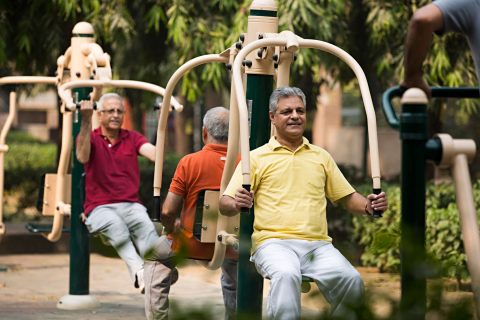Feeling disconnected and alone is a common struggle among many seniors, especially those in their 60s and beyond. This issue is particularly true for Indian families whose children are now constantly leaving their home towns either for a job or for higher studies, contributing to senior isolation.
Multiple reports suggest that in the coming years nuclear families in India will only continue to rise. Losing loved ones or experiencing significant life changes can amplify this feeling. Studies indicate that around 40% of Indians grapple with loneliness. Prolonged loneliness can lead to a range of health issues, including high blood pressure, heart problems, brain health decline, and mental health challenges like depression and anxiety.
The good news is that loneliness is not inevitable, even if you spend a lot of time by yourself. My mother-in-law, Vandana Agrawal is a prime example. Despite facing significant hardships, including the loss of her husband recently, she’s maintained a vibrant spirit. Her friendships, daily rituals like tea on the porch, educating herself about financial management and keeping her zest for learning piano alive has helped her tide over the practical aspect of staying alone but not necessarily feeling lonely all the time. More importantly, she nurtured a positive internal dialogue that encouraged her to keep moving forward, despite her circumstances.
What can you do?
If you’re struggling with loneliness, it’s essential to remember your own resilience. This guide aims to offer you strategies and insights that can help you cope and foster a greater sense of connection and fulfillment in your life. Through CBT-based practices and a proactive mindset, you can discover new ways to overcome the pangs of loneliness and enhance your overall well-being. To start off, here are a few practical tips:
Be aware of your thoughts
If you suspect that loneliness is impacting your mood, it’s helpful to analyse your thought patterns. Are you dwelling on what you lack or regret, or assigning blame to yourself and others? Negative self-talk, characterised by words like ‘never,’ ‘always,’ or ‘should,’ can sustain feelings of hopelessness. For example, believing your children will never call or that your actions won’t change your situation.
Recognising and managing unhelpful thoughts is vital. Distraction or countering negativity with positive affirmations can be effective. For instance, appreciating past companionship while missing a loved one or understanding your children’s busy lives can shift your perspective and ease loneliness. The key is purposefully highlighting positive aspects, like acknowledging daily blessings or maintaining a gratitude journal, which can significantly impact your emotional well-being.
Nurture relationships

Initiating regular contact with loved ones is a powerful way to combat loneliness. If distance is a challenge, consider sending a hand-written note or card regularly. Opt for a humorous card from a local store, adding a brief message like, ‘This might bring a smile to your day… I hope all is well.’
Scheduling a weekly or bi-weekly phone call, regardless of the location, can also strengthen connections. Keep the conversation simple, discussing shared interests or offering support. For those nearby, propose a casual meet-up or a monthly get-together to solidify the bond.
Senior isolation is feeling forgotten, spending solitary days at home while their families are busy. Taking the initiative is key—don’t wait for others to reach out. Embrace the opportunities they offer, even if they differ from your expectations. Building an emotional connection despite physical distance is the ultimate goal. Instead of battling unmet expectations, consider accepting and appreciating the efforts made by your loved ones, allowing the relationship to flourish naturally.
Contribute/Volunteer for a cause

Combat loneliness by rediscovering your sense of purpose. Consider volunteering in your community, like organizing food at a local pantry or fostering a pet to reduce senior isolation. Connecting with younger generations through mentorship or companionship can be fulfilling.
If leaving home is difficult, explore remote opportunities such as assembling care packages or writing letters for charitable organizations. Engage in solitary activities like documenting family stories or completing photo albums too can foster a sense of giving.
In her later years, a friend’s grandmother found purpose in writing notes to accompany meaningful items she would eventually pass on. While it seemed unusual initially, I now realize it gave her a sense of control and purpose.
Routines to enhance emotional health
Consider examining and adjusting your daily routines. Stay physically active by exploring options like chair-based yoga or walking around your home or neighbourhood. Consult your healthcare provider for guidance on suitable physical activities. Yoga has proven to be a very amenable activity that you can do from the comfort of your home- there’s more about its benefits on brain here that you can read here.
You can establish consistent daily activities to regulate sleep, appetite, and mood. Implement “bookend activities” to signal the start and end of your day, such as reading, journaling, listening to music, or enjoying a cup of tea.
Revisiting past hobbies or exploring new activities also combat loneliness. When at Ivory, we once ran a Story Writing Masterclass, the participants found different connections with each other and made new friends and continue to be in touch with each other long after the Masterclass ended.
In a nutshell, it’s the first step that matters. Yes, it’s not easy but once you take the initiative, you might be surprised with the results thereafter. Together, lets reduce the feeling of senior isolation that can lead to memory loss and cognitive decline! Seniors today also grapple with the challenge of effectively managing stress. It’s essential for them to acquire the skills necessary to navigate and mitigate stress in their lives. You can also benefit from finding out your cognitive age and how it compares to your actual age.




